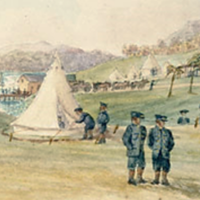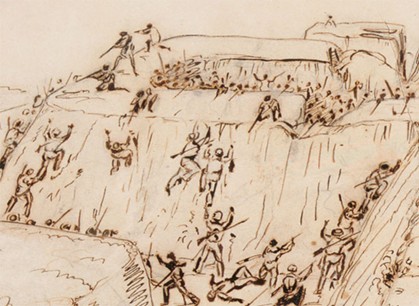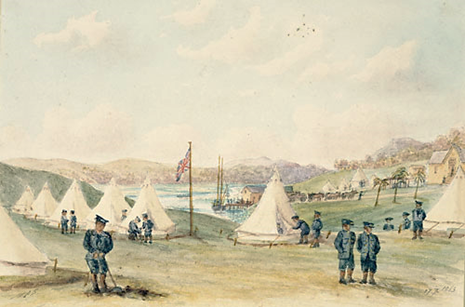
The ‘Forlorn Hope’ at the Battle of Rangiriri 20 November 1863
-
Earlier this year (March 2025), the Cambridge News featured a deserving tribute to Ensign Dugald MacColl of the 3rd Waikato Regiment (Militia) who is reputed to be just the third person interred in the Hautapu (Cambridge) Cemetery. Buried with full military honours, MacColl was barely 22 years of age at his untimely death in 1866. His headstone has been appropriately restored.
Another member of the 3rd Waikatos, also buried at Hautapu, is Thomas Wells. Unlike poor Dugald, Thomas was to live a much longer life as he died in 1910 aged 68. Over much of his lifetime he contributed a great deal towards the development of Cambridge, and for a few years was mayor of the town.
However, Thomas had come close to ‘meeting his Maker’ when just 21 years old, at the Battle of Rangiriri in 1863.
Thomas arrived in New Zealand as a sailor aboard HMS Harrier in 1862. He had joined the Navy in 1859, aged 17, and held the lowly rank of ‘Boy, 1st Class’. The warship made an inauspicious entry into Manukau Harbour by running aground on a mudbank. Fellow shipmate, E W Ewington, described how each of the crew had to pick up a heavy cannonball and walk in a line from one side of the ship to the other until the vessel was rocked off the mud bar on the incoming tide. It was then able to berth at Pahurehure (Papakura) to unload supplies for the Drury military camp in preparation for the invasion of the Waikato.
(Top) Sketch of the Naval Brigade’s unsuccessful attack at Rangiriri
(Credit: Alexander Turnbull Library, A-145-004)
It may have come as something of a surprise for Thomas when he, and most of the Harrier’s crew, were handed muskets and told to board one of two large barges which, along with General Cameron’s main contingent, headed up the Waikato River to the fortified pā at Rangiriri. The ensuing battle was a disaster for the British as the Māori defenders, secure in a well-organised system of trenches, easily repulsed Cameron’s forces after they had launched a frontal attack against the pā.
It was in this bloody confusion that two British officers decided to try to make names for themselves. (The military expression, ‘forlorn hope’, referred to those unfortunate soldiers who were recklessly ordered to attack a position of high risk so that, if successful, great glory might be bestowed on the officer in charge, regardless of the cost.)
As Ewington later detailed, “I was with Tom Wells, as he was familiarly called, in the Battle of Rangiriri, where he was wounded … two other attacks were made – one by 36 artillerymen, led by Captain Mercer, and a forlorn hope of 90 seamen, including Tom Wells, led by Captain Mayne, of HMS Eclipse.”
(Above) Drury Naval Camp
In the early 1860s Drury became a base for the British invasion of the Waikato. This 1863 painting by Henry Scrivener shows the naval camp of HMS Harrier on the Pahurehure Inlet, Manukau Harbour. Supplies were shipped from Onehunga and then transferred to bullock trains (in the background).
(Credit: Alexander Turnbull Library, Ref: B-061-020)
Being shot during any battle is no light matter. However, in spite of any pain or suffering, Thomas was to be the benefactor of two lucky circumstances. His first stroke of good fortune was that the Māori warrior who stood up and fired at him had previously run out of musket balls. Instead, he had primed his musket with nails and bits of metal. Thomas therefore suffered shrapnel wounds rather than a possibly fatal musket ball shot.
Thomas’ second favourable outcome was that his wounds prevented him from accompanying the crew of the Harrier when it sailed to Tauranga a few months later to participate in the Battle of Gate Pā. There, over 35 of his fellow-sailors were killed. Thomas might well have been one of these casualties had he been fit for duty.
I would doubt that Thomas was any sort of gung-ho fighting sailor, or soldier. He was a kind and generous soul throughout his life. On Thomas’ death, his former shipmate, E W Ewington, wrote “Mr Wells … was very much liked and trusted by all on the ship. He was ever ready to help his mates out of hot water by turning the best side to London”. (An old Victorian English expression for extolling the virtues of a subordinate in trouble to a superior officer in order to lessen a forthcoming punishment.)
This article was written by Kevin Wells for the August 2025 edition of the Cambridge Historical Society newsletter.


